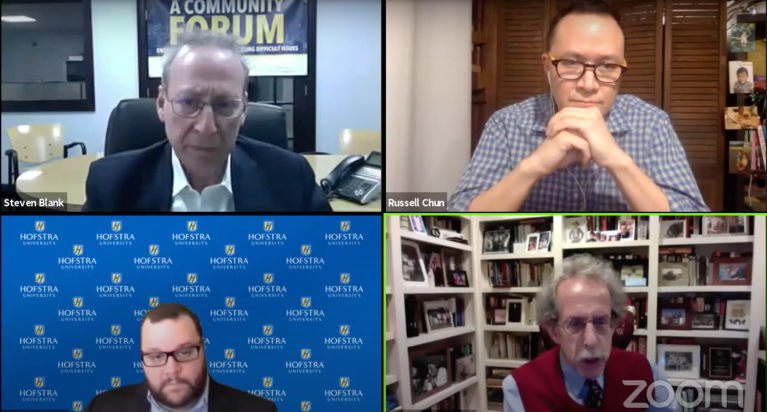
Several college professors and communications experts discussed misinformation in the era of the coronavirus pandemic, saying that now more than ever people are choosing to digest news with a higher click rate rather than a more reliable source.
The discussion on Thursday was part of a series of informational virtual forums conducted by Blank Slate Media.
One panelist, Howard Schneider, is a former editor of Newsday, the current executive director of Stony Brook University’s Center for News Literacy and previously served as founding dean of the university’s School of Journalism.
Schneider said one of the most valuable traits he teaches his students is to not fall for the most popular post or the one with the most clicks, interaction or shares. Discerning between fact-based journalism and propaganda has also become a teaching point.
Schneider said part of teaching students how to tell the difference is to teach them to read or consume media laterally, rather than vertically.
“We read vertically now, which means if I read a text or watch a video, I’ll watch it, and I’ll ask questions,” Schneider said. “Lateral reading means we have to read it and go elsewhere and check it out. That’s how professional fact-checkers work. They leave a text, interrogate it elsewhere and come back.”
Also on the panel was Russell Chun, an associate professor of journalism, media studies and public relations at Hofstra University. Chun was the co-author of “Fake News: Real Issues in Modern Communication.”
On the topic of social media platforms controlling what is posted on their sites, as the nation witnessed when President Donald Trump was suspended from a variety of platforms, Chun said that Facebook and Twitter are privately owned companies and users must abide by the site’s rules of engagements. The fine line, Chun said, comes into play when violence becomes an issue.
“I think for the most part they’ve given wide latitude, for example, Mark Zuckerberg saying ‘I won’t be fact-checking posts, I’m not going to be the arbiter of truth,’” Chun said. “But I think when they cross the line is when there is incitement of violence … It’s like the classic sense of you can’t scream fire in a crowded movie theater.”
Craig Burnett, an associate professor in the political science department at Hofstra and director of its Kalikow School Poll Program, was also on the panel. In addition to teaching courses on research methods and statistics, Burnett instructs in American government, urban politics, state and local government, public opinion and political behavior.
Burnett acknowledged that Facebook has changed significantly since its creation nearly 17 years ago, but what has changed even more is the amount of responsibility that the website bears because it is one of the prominent sources of news and misinformation.
“When you take on that role, your responsibility should shift too,” Burnett said. “It’s not a question of resources as it is a question of will. So now they’re finally starting to do that and [the Capitol attack] was the event that pushed them over the line.”
Burnett said with all of the funds and resources Facebook has at its disposal, discerning between fact-based journalism and propaganda should have been done “much earlier.”
The panelists agreed that in terms of the coronavirus pandemic, information became more politicized than it should have. Schneider said it was hard to comprehend how people could choose not to wear a mask after watching thousands of people die by the day as a result of the virus.
“I don’t think most Americans are rejecting science. I think it’s about the failure of leadership and the politicization of this issue,” Schneider said. “You had the Washington Post story where nurses are reporting that people are dying in their deathbed refusing to concede that they are dying from COVID.”
Burnett acknowledged that a majority of people who supported and followed the lead of Democratic officials wore masks. The mask controversy, Burnett said, is a prime example of when political leads do not converge and it brings polarization.
“When all of this started to happen, I turned to a colleague and said ‘We’re going to see polarization on this issue’ because they’re going to want to avoid an economic shutdown when it was pretty clear it needed to happen anyway.”
Chun noted that misinformation about the coronavirus, politics or any other subject matter doesn’t just come from the reporting or textual information. Memes have become a medium for information to spread like wildfire to a younger audience.
“There’s no algorithm that can sift through the memes and say ‘that’s misleading or that’s not allowed on our platform,’ so media comes in a lot of different forms which is pretty difficult to track,” Chun said.
Those interested in listening to the entire discussion can do so on The Island Now YouTube channel or by going directly to the link: https://www.youtube.com/watch?v=j-VG9-1GiNs.






